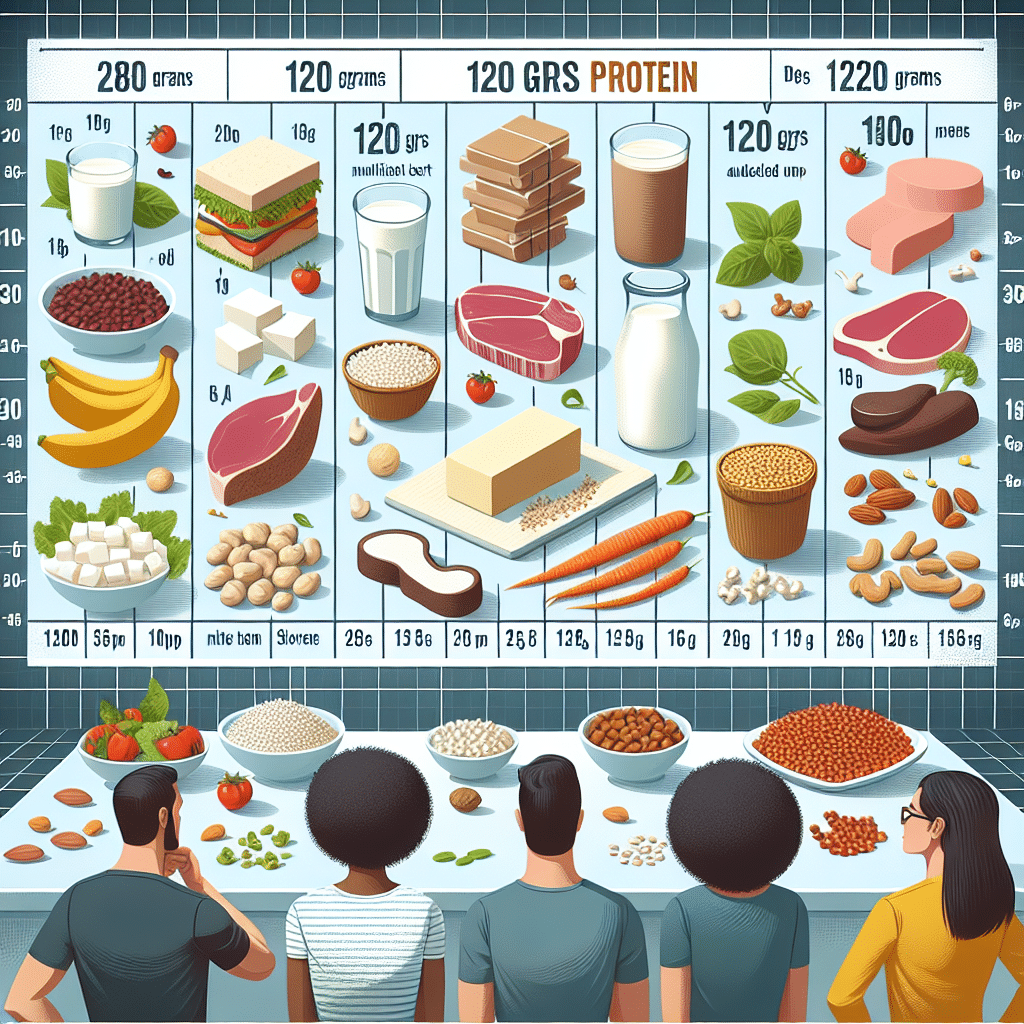120 Grams of Protein: Meeting Your Goals
-
Table of Contents
- 120 Grams of Protein Daily: Strategies for Achieving Your Nutritional Targets
- Understanding the Importance of Protein
- How Much Protein Do You Really Need?
- Strategies for Incorporating 120 Grams of Protein into Your Diet
- Plan Your Meals
- Choose High-Quality Protein Sources
- Opt for Protein-Rich Snacks
- Track Your Intake
- Benefits of Consuming 120 Grams of Protein
- Challenges and Considerations
- Case Studies and Statistics
- Conclusion: Meeting Your Protein Goals with Ease
- Discover ETprotein’s Premium Protein Products
120 Grams of Protein Daily: Strategies for Achieving Your Nutritional Targets

Protein is a vital macronutrient that plays a crucial role in building muscle, repairing tissue, and producing enzymes and hormones. For individuals aiming to meet specific fitness goals, consume a balanced diet, or manage their weight, understanding how to incorporate 120 grams of protein into their daily regimen is essential. This article will explore practical ways to reach this protein target, the benefits of doing so, and how to ensure that your protein intake is both sustainable and beneficial to your overall health.
Understanding the Importance of Protein
Proteins are made up of amino acids, which are the building blocks of our muscles and tissues. Consuming adequate protein is important for:
- Muscle growth and repair
- Weight management
- Metabolic health
- Immune system function
- Hormone production
For athletes, bodybuilders, or those engaged in regular physical activity, protein is especially critical to support recovery and muscle hypertrophy. However, even sedentary individuals require a baseline level of protein to maintain bodily functions.
How Much Protein Do You Really Need?
The Recommended Dietary Allowance (RDA) for protein is 0.8 grams per kilogram of body weight for the average adult. However, this is a baseline for the general population. Athletes, those looking to gain muscle mass, or individuals recovering from injury may require more protein. For example, strength and endurance athletes may need up to 1.2 to 2.0 grams of protein per kilogram of body weight.
Setting a goal of 120 grams of protein daily is a common target for many active individuals. This amount supports muscle maintenance and growth while also providing the satiety and metabolic benefits associated with high-protein diets.
Strategies for Incorporating 120 Grams of Protein into Your Diet
Meeting a protein target of 120 grams per day can seem daunting, but with the right approach, it’s entirely achievable. Here’s how:
Plan Your Meals
Divide your protein intake evenly throughout the day to maximize absorption and utilization by the body. Aim for 20-30 grams of protein per meal, with protein-rich snacks in between if necessary.
Choose High-Quality Protein Sources
Include a variety of protein sources to ensure you’re getting all essential amino acids. Good sources include:
- Lean meats (chicken, turkey, lean beef)
- Fish and seafood
- Dairy products (Greek yogurt, cottage cheese, milk)
- Eggs
- Plant-based proteins (tofu, tempeh, legumes, quinoa)
- Protein supplements (whey, casein, plant-based powders)
Opt for Protein-Rich Snacks
Snacking on protein-rich foods can help you reach your daily goal. Consider options like:
- Nuts and seeds
- Protein bars or shakes
- Hard-boiled eggs
- String cheese
- Edamame
Track Your Intake
Use a food diary app or a simple journal to keep track of your protein intake. This will help you stay on target and make necessary adjustments.
Benefits of Consuming 120 Grams of Protein
There are several benefits to consuming a high-protein diet:
- Muscle Growth: Adequate protein intake is essential for muscle protein synthesis, which leads to muscle growth and strength gains.
- Weight Management: Protein has a higher thermic effect than other macronutrients, meaning it burns more calories during digestion. It also increases satiety, which can help prevent overeating.
- Better Recovery: Consuming enough protein aids in the repair of muscle tissue damaged during exercise, leading to faster recovery times.
- Improved Metabolic Health: High-protein diets have been linked to improved blood pressure, glucose levels, and other metabolic health markers.
Challenges and Considerations
While aiming for 120 grams of protein per day, it’s important to consider the following:
- Individual dietary restrictions or preferences may require tailored protein sources.
- Excessive protein intake can be hard on the kidneys over time, especially for those with preexisting kidney conditions.
- Balance is key; ensure you’re also getting enough carbohydrates and fats for overall health.
Case Studies and Statistics
Research has shown that higher protein diets can be effective for various goals. For instance, a study published in the “Journal of the International Society of Sports Nutrition” found that protein supplementation significantly improved muscle size and strength in individuals engaged in resistance training.
Statistics from the National Health and Nutrition Examination Survey indicate that the average American consumes approximately 16% of their calories from protein, which may be below the optimal range for active individuals and athletes.
Conclusion: Meeting Your Protein Goals with Ease
Achieving a daily intake of 120 grams of protein is a realistic goal with proper planning and dietary choices. By understanding the importance of protein, choosing high-quality sources, and spreading intake throughout the day, you can support your health and fitness objectives effectively.
Discover ETprotein’s Premium Protein Products
If you’re looking to supplement your protein intake, consider ETprotein’s range of high-quality plant-based proteins. Their products are designed to cater to various dietary needs and preferences, ensuring that you can meet your protein goals with ease.
About ETprotein:
ETprotein, a reputable plant protein vegan protein Chinese factory manufacturer and supplier, is renowned for producing, stocking, exporting, and delivering the highest quality organic bulk vegan protein and plant proteins. They include Organic rice protein, clear rice protein, pea protein, clear pea protein, watermelon seed protein, pumpkin seed protein, sunflower seed protein, mung bean protein, peanut protein etc. Their offerings, characterized by a neutral taste, non-GMO, allergen-free attributes, cater to a diverse range of industries. They serve nutraceutical, pharmaceutical, cosmeceutical, veterinary, as well as food and beverage finished product distributors, traders, and manufacturers across Europe, USA, Canada, Australia, Thailand, Japan, Korea, Brazil, and Chile, among others.
ETprotein specialization includes exporting and delivering tailor-made protein powder and finished nutritional supplements. Their extensive product range covers sectors like Food and Beverage, Sports Nutrition, Weight Management, Dietary Supplements, Health and Wellness Products, and Infant Formula, ensuring comprehensive solutions to meet all your protein needs.
As a trusted company by leading global food and beverage brands and Fortune 500 companies, ETprotein reinforces China’s reputation in the global arena. For more information or to sample their products, please contact them and email sales(at)ETprotein.com today.












